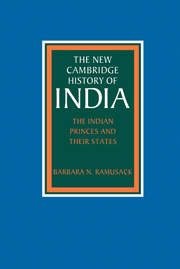Book contents
- Frontmatter
- 1 Introduction: Indian princes and British imperialism
- 2 Princely states prior to 1800
- 3 The British construction of indirect rule
- 4 The theory and experience of indirect rule in colonial India
- 5 Princes as men, women, rulers, patrons, and Oriental stereotypes
- 6 Princely states: administrative and economic structures
- 7 Princely states: society and politics
- 8 Federation or integration?
- Bibliographical Essay
- Glossary
- Index
- THE CAMBRIDGE HISTORY OF INDIA
- References
4 - The theory and experience of indirect rule in colonial India
Published online by Cambridge University Press: 28 March 2008
- Frontmatter
- 1 Introduction: Indian princes and British imperialism
- 2 Princely states prior to 1800
- 3 The British construction of indirect rule
- 4 The theory and experience of indirect rule in colonial India
- 5 Princes as men, women, rulers, patrons, and Oriental stereotypes
- 6 Princely states: administrative and economic structures
- 7 Princely states: society and politics
- 8 Federation or integration?
- Bibliographical Essay
- Glossary
- Index
- THE CAMBRIDGE HISTORY OF INDIA
- References
Summary
COLONIAL SOCIOLOGY, CLASSIFICATION AND HIERARCHY
Throughout their imperial tenure in India, British administrators described and categorised Indian legal practices, religious beliefs and rituals, social structures and customs, and languages and literatures. British officials in India and in the metropole used these data to construct a static, underdeveloped India that legitimated British political dominance. This knowledge was not disinterested or objective but imbricated with political power. Analysed by Edward Said as Orientalism, this information has also been termed colonial sociology or, more broadly, colonial knowledge. More recently, C. A. Bayly has argued that Indians participated significantly in the creation of the British information order, which remained contested and incomplete. Although these intellectual constructions and scholarship have focused on the directly ruled territory and peoples of British India, several subsumed the indirectly ruled domains and peoples of princely states. They included gazetteers that were compendia of geographical, historical and statistical data; the Great Trigonometrical Survey that supposedly provided a scientific skeleton for surveys, mapping and a spatial conception of India; and decennial censuses issued from 1871. After 1858 colonial knowledge specifically targeted the princes and their states.
Initially British officials discovered that there were relatively few documentary bricks with which to erect the intellectual framework of indirect rule. Treaties had been concluded depending on the exigencies of war, financial need, personal inclinations of men on the spot, internal politics of the Company, and a state's relationship to the Mughal Empire or other indigenous political entities. There were few documents of explication and no comprehensive collection of treaties or other legal documents such as sanads and letters of understanding.
- Type
- Chapter
- Information
- The Indian Princes and their States , pp. 88 - 131Publisher: Cambridge University PressPrint publication year: 2003

